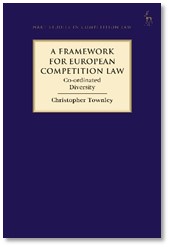Dear Readers,
The KSLR European Law Blog would like to bring the following recent publications on EU law topics to your attention.
Happy reading!
The KSLR European Law Blog Editorial Team
EU Anti-Discrimination Law Beyond Gender
Edited by Uladzislau Belavusau and Kristin Henrard
The EU has slowly but surely developed a solid body of equality law that prohibits different facets of discrimination. While the Union had initially developed anti-discrimination norms that served only the commercial rationale of the common market, focusing on nationality (of a Member State) and gender as protected grounds, the Treaty of Amsterdam (1997) supplied five additional prohibited grounds of discrimination to the EU legislative palette, in line with a much broader egalitarian rationale. In 2000, two EU Equality Directives followed, one focusing on race and ethnic origin, the other covering the remaining four grounds introduced by the Treaty of Amsterdam, namely religion, sexual orientation, disabilities and age.
Eighteen years after the adoption of the watershed Equality Directives, it seems timely to dedicate a book to their limits and prospects, to look at the progress made, and to revisit the rise of EU anti-discrimination law beyond gender. This volume sets out to capture the striking developments and shortcomings that have taken place in the interpretation of relevant EU secondary law. Firstly, the book unfolds an up-to-date systematic reappraisal of the five ‘newer’ grounds of discrimination, which have so far received mostly fragmented coverage. Secondly, and more generally, the volume captures how and to what extent the Equality Directives have enabled or, at times, prevented the Court of Justice of the European Union from developing even broader and more refined anti-discrimination jurisprudence. Thus, the book offers a glimpse into the past, present and – it is hoped – future of EU anti-discrimination law as, despite all the flaws in the Union’s ‘Garden of Earthly Delights’, it offers one of the highest standards of protection in comparative anti-discrimination law.
Uladzislau Belavusau is Senior Researcher in European Law at the TMC Asser Institute (The Hague), University of Amsterdam.
Kristin Henrard is a Professor of Law at the Faculty of Law, Erasmus University Rotterdam.
November 2018 | 9781509915019 | 392pp | Hbk | RSP: £60
Discount Price: £48
Order online at www.hartpublishing.co.uk – use the code CV7 at the checkout to get 20% off your order!
A Framework for European Competition Law
Co-ordinated Diversity
Christopher Townley
This book asks whether the current push to increase uniformity in substantive and procedural competition policy and enforcement in Europe, as well as in related institutional structures, is desirable. It focuses on European Union (EU) competition policy and enforcement (related to Articles 101 and 102 TFEU and the merger rules), the equivalent rules in the Member States, and the relationships between these different legal orders.
Uniformity has many benefits; yet, the advantages of diversity are also legion, enabling more policy experimentation and innovation; and improving the ability to accommodate national preferences.
Contrary to the overwhelming view of academics, practitioners and regulators in this area, the book argues that uniformity is insufficient and examines ways of achieving a better mix of uniformity and diversity (the EU’s motto is ‘United in Diversity’). To achieve this better mix, the book offers a new framework for European competition law: Co-ordinated Diversity. Finally, this book discusses whether Co-ordinated Diversity fits with the current legal order in the EU, as well as the EU constitutional settlement more generally, and suggests some ways that it might be made compatible with this order with relative ease.
The book’s impact could be significant: changing the results in individual cases; the way cases are argued; and what information is relevant. More importantly, it builds the theoretical foundations for fundamentally altering the way in which the EU and the Member States’ competition authorities interact, allowing space for disagreement and uncertainty. The aim is to improve the effiiciency and effectiveness of competition policy-making and enforcement in Europe. It should also increase the legitimacy in this field (rebalancing towards the Member States). Co-ordinated Diversity provides a new way of seeing the EU that better blends difference, when this is demanded, with uniformity and its benefits, as necessary. A timely and ambitious work, this book will be read with interest by all competition scholars.
Christopher Townley is a Lecturer in Law at King’s College London.
November 2018 | 9781509916443 | 584pp | Hbk | RSP: £110
Discount Price: £88
Order online at www.hartpublishing.co.uk – use the code CV7 at the checkout to get 20% off your order!
The Age of ESMA
Governing EU Financial Markets
Niamh Moloney
Since its establishment in 2011, the European Securities and Markets Authority (ESMA) has become a pivotal actor in EU financial market regulation and supervision. Its burgeoning influence extends from the rule-making process to supervisory convergence/coordination to direct supervision. Reflecting the now critical importance of ESMA to how the EU regulates and supervises financial markets, and with ESMA at an inflection point in its evolution, particularly in light of the Commission’s 2017 proposals to reform ESMA and the UK’s withdrawal from the EU, The Age of ESMA maps, contextualises, and examines ESMA’s role and the implications for EU financial market governance.
Niamh Moloney is Professor of Financial Markets Law at the London School of Economics and Political Science and a Fellow of the British Academy.
November 2018 | 9781509921775 | 376pp | Hbk | RSP: £85
Discount Price: £68
Order online at www.hartpublishing.co.uk – use the code CV7 at the checkout to get 20% off your order!


